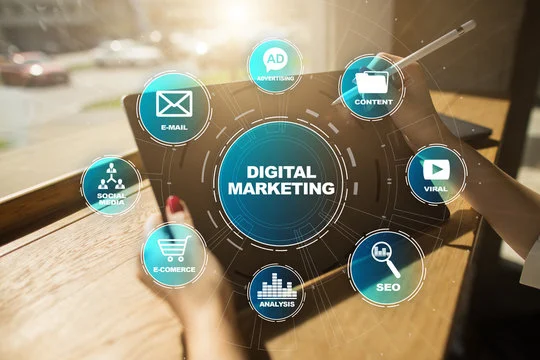ONLINE DIGITAL MARKETING
What is Digital Marketing?
Digital marketing refers to the use of digital channels, platforms, and technologies to promote products, services, or brands to a targeted audience. It includes a wide range of online marketing tactics such as:
Search Engine Optimization (SEO) – improving website visibility in search engines like Google.
Social Media Marketing – promoting content on platforms like Facebook, Instagram, LinkedIn, and Twitter.
Email Marketing – sending personalized messages and offers directly to customers’ inboxes.
Content Marketing – creating valuable and relevant content (blogs, videos, infographics) to attract and retain an audience.
Pay-Per-Click (PPC) Advertising – placing paid ads on search engines or social media to drive traffic.
Affiliate and Influencer Marketing – partnering with others to promote your brand or products.
Mobile Marketing – reaching customers via mobile apps, SMS, and mobile-optimized websites.
Online Digital marketing allows businesses to connect with their audience in real-time, measure performance through analytics, and adjust strategies quickly. It’s cost-effective, targeted, and essential for growth in today’s online-driven world.

Key Components of Digital Marketing:
Search Engine Optimization (SEO): Enhances website visibility on search engines, driving organic traffic by optimizing content and structure.
Content Marketing: Focuses on creating and distributing valuable content to attract and engage a target audience, fostering trust and authority. Wikipedia
Social Media Marketing: Utilizes platforms like Facebook, Instagram, and Twitter to promote products and interact with customers, building brand awareness and loyalty.
Pay-Per-Click Advertising (PPC): Involves placing ads on search engines or social media, paying a fee each time the ad is clicked, offering immediate visibility.
Email Marketing: Engages customers directly through personalized emails, nurturing relationships and encouraging repeat business.
Affiliate Marketing: Partners with external websites or individuals to promote products, rewarding them for driving traffic or sales.
Influencer Marketing: Collaborates with influential individuals to reach their followers, leveraging their credibility to promote products or services.
Emerging Trends in Digital Marketing:
Artificial Intelligence (AI): Utilized for personalized content creation and customer service, enhancing user experience. Global Media Insight+2Simplilearn.com+2WebFX+2
Video Content: Gains prominence as a preferred medium for storytelling and product demonstrations, increasing engagement rates.
Voice Search Optimization: Becomes essential as more consumers use voice-activated devices, altering search behaviors and SEO strategies.
Interactive Content: Engages users through quizzes, polls, and augmented reality experiences, fostering deeper connections.
Sustainability Marketing: Highlights eco-friendly practices, appealing to environmentally conscious consumers and enhancing brand image.
Challenges in Digital Marketing:
Data Privacy Regulations: Necessitates compliance with laws like GDPR, impacting data collection and personalized marketing efforts.WebFX
Market Saturation: Requires innovative strategies to stand out in a crowded digital landscape.
Rapid Technological Changes: Demands continuous learning and adaptation to new tools and platforms.WebFX+2Global Media Insight+2Simplilearn.com+2
Consumer Skepticism: Addresses the need for authenticity and transparency to build trust with audiences.
Algorithm Dependence: Highlights the risk of relying heavily on platform algorithms that can change unpredictably.
In conclusion, digital marketing is an indispensable tool in the modern business environment, offering unparalleled opportunities for growth and engagement. By understanding its components, benefits, and challenges, businesses can craft effective strategies that resonate with their target audiences and achieve their marketing objectives.